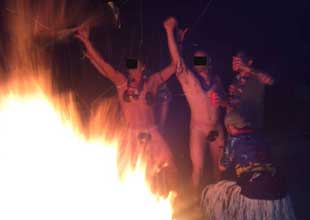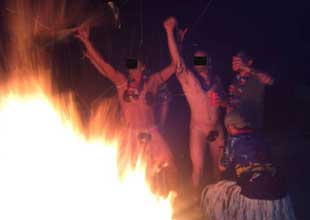It’s considered one of the most dangerous airports in the world, and starting soon Baghdad International will be under the protection of the same private security empire whose embassy guards in Kabul engaged in a range of misconduct and drunken hazing rituals, including those now infamous vodka buttshots. Recently, Iraq’s governing council selected ArmorGroup to take over airport security, replacing a company called Sabre International, which has held the contract for the past year.
The security contract is worth $22.5 million, according to Agence France Presse, and comes a little over two months after the Project on Government Oversight exposed a pattern of misbehavior by ArmorGroup employees protecting the US Embassy in Kabul under a $189 million State Department contract. The controversy led to the firings of more than a dozen ArmorGroup personnel, prompted an ongoing investigation by the State Department’s Inspector General, and could eventually end up costing the company the embassy contract.
The embassy guards were employed by ArmorGroup North America (AGNA). The company is part of the same Danish-British security conglomerate, G4S, as ArmorGroup Iraq, the division that will be providing security at Baghdad International.
For G4S and ArmorGroup, the Kabul embassy scandal couldn’t have happened at a worse time. Weeks earlier, on August 9th, an ArmorGroup employee gunned down two of his colleagues and seriously wounded a third during a drunken confrontation in Baghdad’s Green Zone. The contractor, an ex-British paratrooper named Daniel Fitzsimons, had a history of psychiatric problems, drug and alcohol abuse, and violent behavior. His parents described him as a “human timebomb,” suffering from serious Post Traumatic Stress Disorder following deployments in war zones including Kosovo and Afghanistan. Fitzsimons, who maintains he acted in self defense, had been dismissed by two other private security companies operating in Iraq, one of which cited “extreme negligence” as the cause for his firing. When ArmorGroup brought Fitzsimons on, he was facing trial in the UK on assault charges, having already been convicted of robbery and possession of ammunition.
Weeks after Fitzsimons’ arrest, ArmorGroup officially fired him “on the grounds of gross misconduct.” The company claimed to have evidence that he “falsified information during the recruitment process” and insisted “his screening was not completed in line with the company’s procedures.” Patrick Toyne-Sewell, an ArmorGroup spokesman, told me that following the Green Zone shooting the company “installed an additional team of screening professionals who checked through every single employment file to make sure the records were up to date and contained everything required to confirm suitability for employment with the company and deployment to Iraq and other hostile environments. We also introduced new processes to ensure that these standards were applied strictly to future recruitment.” He said he was unable to go into further detail, adding, “we have done everything we can to make sure that employees cannot be deployed without all of the necessary checks being in place in the future.”
ArmorGroup’s vetting practices have been called into question before. A lawsuit [PDF] filed in September by AGNA’s former director of operations, James Gordon, alleges the company’s management placed “corporate profit over safety” and relied on lax hiring standards when it came to fielding a guard force to protect the US embassy in Kabul. AGNA staffed the embassy contract, he says, with “unqualified, poorly vetted personnel.” Among them, he says, was a security operator “who had been fired from a previous project for pulling a pistol on another employee while drunk”—an episode that could have easily escalated into the type of situation that has Fitzsimons cooling his heels in an Iraqi jail and potentially facing the death penalty. According to Gordon’s whistleblower retaliation and false claims act suit against his former employer, repeated warnings about the quality and competence of ArmorGroup’s personnel—and the fact that “the training program run for new hires” was “plagued with hazing and intimidation”—went unheeded by the company’s top management.
Like the US embassy in Kabul, Baghdad’s airport is a high-risk target. Lying at the end of a once treacherous seven-mile stretch of road known as “Route Irish,” the airport is a hub for visiting dignitaries, press, contractors, and many others transiting to or from Baghdad. (In the past, the airport and its environs have been a frequent target for rocket and mortar attacks.) Though the security situation in Iraq has vastly improved, this is not the type of place where you can afford to take chances. Perhaps ArmorGroup has convinced Iraqi officials that it’s up to the job. Or has the Iraqi government seriously overlooked the baggage of its new airport security provider?
Follow Daniel Schulman on Twitter.















